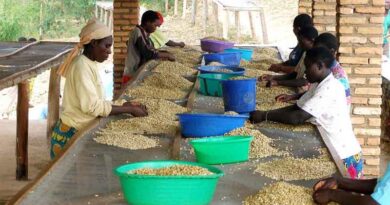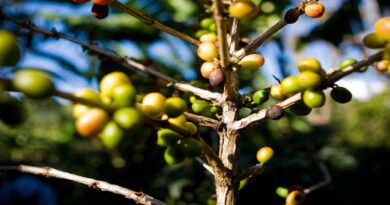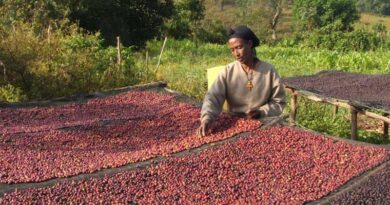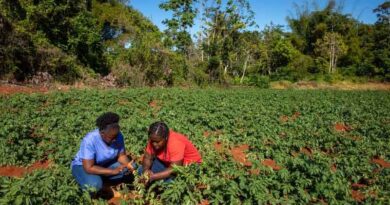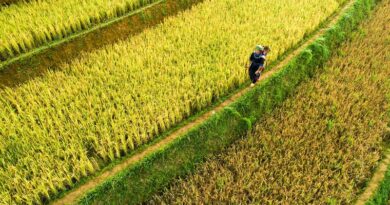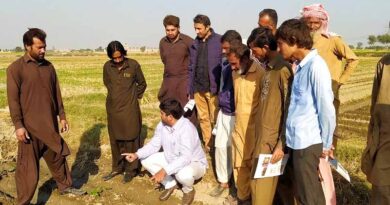CABI-led study suggests women’s role in coffee production should be promoted across whole value chain
06 October 2022, Africa: A new CABI-led study published in the journal Sustainability suggests that the role of women in coffee production should be promoted across the whole value chain as well as improving their access to productive resources and services.
The study found that while some of the technologies and practices promoted to increase coffee harvesting and primary processing brought positive benefits for households – by improving coffee quality, market access and their income – it has mixed outcomes for women.
Although women were not primarily targeted by measures to improve coffee processing and quality, their role and participation in implementing the improved coffee harvesting and processing technologies/practices nevertheless fostered women’s skills, confidence and decision-making power.
The research also found that some of the new technologies/practices needed extra work thus adding to women’s workload, while others saved labour and eased their work. As a result of increasing the wholesale trading of coffee, the role of marketing the product appeared to largely shift to men.
The scientists reference Kemal et al who noted that in Ethiopia men take the lion’s share in marketing coffee, which gives them an opportunity to control the income.
They also point to the Food and Agriculture Organization (FAO) of the United Nations who similarly reported that the marketing and income from cash crops grown at larger scale, such as coffee, are controlled by the household head, who are mainly male.
Coffee is one of the vital commodities in the Ethiopian economy, generating 24 percent of the country’s total export earnings and supports the livelihoods of a quarter of the population.
Smallholders are responsible for about 95 percent of the coffee produced in Ethiopia, with a low-input, low-output system, making Ethiopian coffee production naturally ‘organic.’
However, the productivity and quality potential of Ethiopian coffee has not been fully realised due to various factors, including reliance on traditional production and processing technologies and practices.
Dr Negussie Efa Gurmessa, Scientist and Programmes Manager at CABI and a lead author on the paper, said, “This study examines sustainability and gender dynamics of coffee value-chain development intervention in Ethiopia.
‘’The study found that some of the introduced technologies/practices were adopted and sustained whereas others were dropped or adapted depending on technical, institutional, and socio-economic factors.
“It underscores the need for a proper gender analysis and embedding gender-sensitive approaches in designing development interventions to ensure women’s fair representation, and thus equitable and sustainable benefits.
“Such efforts should entail a paradigm shift from production to promoting women’s role and integration into the entire value chain, as well as improving their access to productive resources and services.
“Moreover, value-chain development interventions should consider technical, institutional, social, and economic factors that could influence their effectiveness and sustainability.”
The study also discovered that some of the activities around coffee production which required more physical strength were the domain of men. These included land preparation, slashing weeds and the stumping and pulping of cherry.
On the other hand, planting, hand weeding, harvesting, transporting, sorting and drying coffee were largely women’s duties.
Dr Morris Akiri, co-author of the study and Senior Regional Director for CABI Africa, noted that the initiative under study is one of the coffee quality improvement and value chain development interventions where a public-private partnership was employed/tested and proved to generate positive results and experiences and lessons that can be replicated.
Co-author of the study, Dr Dannie Romney, CABI’s Senior Global Director, Development Communication and Extension, said, “Following the end of the project and the temporary market linkage, some male farmers devised mechanisms to continue accessing higher value markets, which the female farmers were not able to do.
“If male and female famers are to sustainably benefit, value chain development efforts should not solely focus on short-lived arrangements nor be gender-blind as the outcome of such interventions can undermine gender equalities.
“The study suggests that adopting gender-sensitive and gender-responsive approaches would enhance gender equity and sustainability of the intervention and benefits.”
Also Read: India signs deal with Dubai company to improve DAP and NPK supply
(For Latest Agriculture News & Updates, follow Krishak Jagat on Google News)




